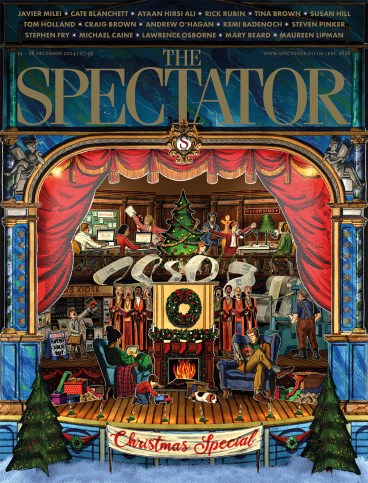
More than a thousand musicians took part when Handel’s Messiah was performed in Westminster Abbey in May 1791. It wasn’t the only item on the bill, either; it was part of a day-long blow-out that lasted from 11 a.m. to 5 p.m. and also included the whole of Handel’s Israel in Egypt. The crowd came prepared. According to Adalbert Gyrowetz, a Bohemian composer then living in London, the audience munched on ‘hard-boiled eggs, ham and roast meat’ during the intervals. ‘One had almost to wade through a mass of eggshells and other rubbish on the way out of the church,’ he noted.
Romaniw was everything you’d want in a Tosca: proud, impulsive, fearsome and vulnerable
Things were a bit more demure when the Academy of Ancient Music and Westminster Abbey’s own choir performed Messiah in the Abbey the week before Advent. I didn’t see any impromptu picnics, I’m sad to say; and of course, no one these days expects Messiah to be done with Mahler 8 forces. An orchestra of 21 players was conducted by the Abbey’s organist Andrew Nethsingha, and the choir numbered 37, including 25 boy trebles whose utterly distinctive tone quality gave the overall sound a wonderful luminescence – a halo, you might say.
In short, it was what we’ve come to call an ‘authentic’ sized performance, although we shouldn’t, because there’s no such thing. Or at least, there’s no one such thing. Whenever Handel directed Messiah in his own lifetime, he adapted it to the musicians and venue at hand, and for more than two centuries it was generally accepted that the best way to honour Handel’s intentions was to go large. Within living memory Messiah typically meant something like the version that, on 19 ”78s in a stout cardboard box, was the pride and glory of my grandfather’s record collection: Malcolm Sargent conducting the Royal Liverpool Philharmonic and the Huddersfield Choral Society, with nourishing vibrato and a resplendent fullness of sound.

Magazine articles are subscriber-only. Keep reading for just £1 a month
SUBSCRIBE TODAY- Free delivery of the magazine
- Unlimited website and app access
- Subscriber-only newsletters








Comments
Join the debate for just $5 for 3 months
Be part of the conversation with other Spectator readers by getting your first three months for $5.
UNLOCK ACCESS Just $5 for 3 monthsAlready a subscriber? Log in